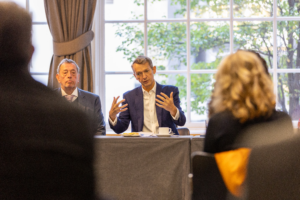FutureLearn and the University of Groningen re-think Europe beyond the EU
University of Groningen’s course ‘European Culture and Politics’ is available to join now and starts on 1st May 2017
London, UK, 28th April 2017: The leading social learning platform, FutureLearn, today announces with its partner, the University of Groningen, the upcoming run of their course: ‘European Culture and Politics’.
The announcement is made following the triggering of Article 50 as a result of the referendum on Brexit on June 23rd, 2016 and the subsequent uncertainty surrounding the United Kingdom’s future relationship, specifically with the European Union and with Europe more broadly speaking.
In the build-up to the UK General Election on 8th June 2017, this course, the result of years of collaboration among various European and non-European universities under the umbrella of the Erasmus Mundus Master programme Euroculture, examines the idea of Europe beyond the EU, and will connect each topic – culture, religion, modernity, nation-state and democracy – to one or more crises currently linked to Europe.
People will also have the chance to look at key obstacles challenging European integration, such as the financial crisis, rising nationalism and migration. The course will also look at the construction of Europe with a philosophical slant, asking key questions to understand how struggles over the meaning of Europe have shaped European contemporary society and how they will shape the future of Europe.
By the end of the course, learners will be able to identify solutions to problems of contemporary integration, including growing citizen alienation, lack of solidarity and the citizen/community relationship. Learners will also be able to identify main transdisciplinary debates on Europe and European cultural identity and propose solutions to issues such as the future of European integration and democracy in a diverse community.
The course is designed for those with a professional and/ or personal interest in European politics and culture. It is also suited to those who have completed previous studies into Europe, current Humanities and Social Science students, as well as policy makers and those working in NGOs.
Senka Neuman, lecturer and researcher at the University of Groningen and lead educator of the course, said: “Europe is such a complex topic. In this course, we really study how Europe is given meaning and a certain identity. The European Union is, for better or worse, one of the most important actors in those processes. Whether we’re talking about the Brexit referendum, or the French and upcoming British elections, they are as much about identity as they are about (other) political and economic issues. In this course, we hope to show at least the beginnings of what that means.”
Nigel Smith, Head of Content at FutureLearn, commented: “This course really does show social learning at its best; learners can participate in rich debate and receive global insight about a topic that is pivotal in today’s political climate. Learners will be able to collaborate to tackle the challenging task of defining Europe whilst being exposed to a myriad of perspectives worldwide. It’s fantastic that our partner is exploring a topic that receives so much political scrutiny today, but also provides learners the chance to reflect, challenge and share their own views.”
As with all FutureLearn courses, the course can be taken for free or there is the option to upgrade for £39 to get extra benefits.
Notes to editors
About FutureLearn
Founded by The Open University in 2012, FutureLearn is a leading social learning platform, enabling online learning through conversation. With almost 6 million people from over 231 countries across the globe – a community that is continuously growing – it offers free and paid for online courses from world-leading UK and international universities, as well as organisations such as Microsoft, the British Council and Cancer Research UK. FutureLearn’s course portfolio covers a wealth of areas to promote lifelong learning for a range of applications including general interest, an introduction to university studies, continuing professional development and fully online postgraduate degrees.
About the University of Groningen
The University of Groningen is a research university with a global outlook, deeply rooted in Groningen, in the north of the Netherlands. Quality has had top priority for 400 years, and with success the University is currently in or around the top 100 on several influential ranking lists.
In addition, the university collaborates with a number of renowned foreign universities, including Uppsala, Göttingen and Ghent. The University of Groningen is very popular with its 27,000 students and 5500 staff members from home and abroad.
Talent is nurtured, enabling the University to bridge the gap between science and society.We are committed to actively collaborating with our social partners, with a special focus on the research themes Healthy Ageing, Energy and Sustainable Society.
For more information, please contact:
Rachel MacPherson, PR Executive, FutureLearn
Email: rachel.macpherson@futurelearn.com
Niamh O’Grady, Senior Communications Manager, FutureLearn
Email: niamh.ogrady@futurelearn.com


